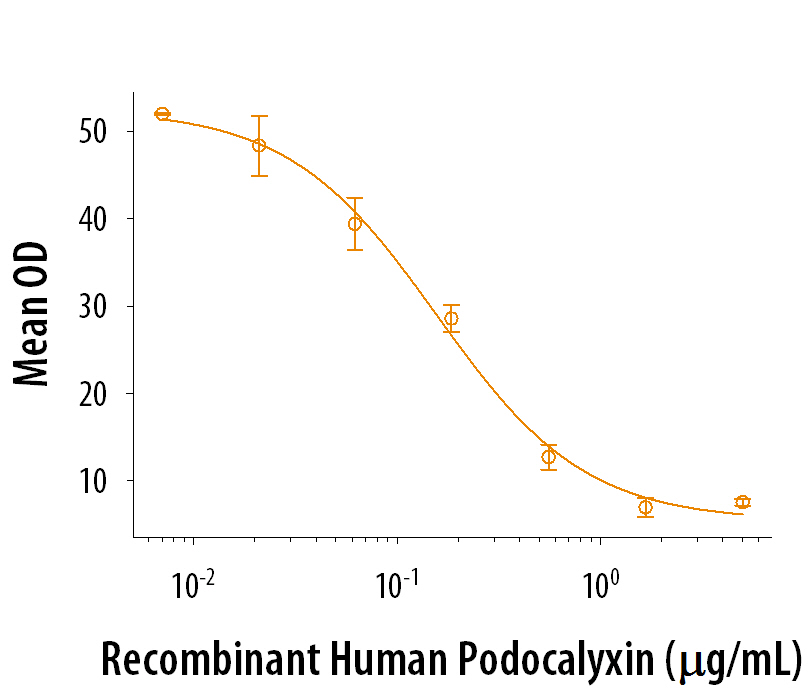Recombinant Human Podocalyxin Protein, CF Summary
Product Specifications
Ser23-Arg427 and a C-terminal Asp and 10-His tag
Analysis
Product Datasheets
Carrier Free
CF stands for Carrier Free (CF). We typically add Bovine Serum Albumin (BSA) as a carrier protein to our recombinant proteins. Adding a carrier protein enhances protein stability, increases shelf-life, and allows the recombinant protein to be stored at a more dilute concentration. The carrier free version does not contain BSA.
In general, we advise purchasing the recombinant protein with BSA for use in cell or tissue culture, or as an ELISA standard. In contrast, the carrier free protein is recommended for applications, in which the presence of BSA could interfere.
1658-PD
| Formulation | Lyophilized from a 0.2 μm filtered solution in PBS. |
| Reconstitution | Reconstitute at 100 μg/mL in PBS. |
| Shipping | The product is shipped at ambient temperature. Upon receipt, store it immediately at the temperature recommended below. |
| Stability & Storage: | Use a manual defrost freezer and avoid repeated freeze-thaw cycles.
|
Scientific Data
 View Larger
View Larger
Immobilized Recombinant Human Podocalyxin inhibits the adhesion of CHO Chinese hamster ovary cells transfected with P-Selectin.
Reconstitution Calculator
Background: Podocalyxin
Podocalyxin (PODXL), also known as Podocalyxin-like protein 1 (PCLP-1), is a heavily glycosylated transmembrane sialoprotein in the CD34 and Endoglycan family (1). Mature human Podocalyxin consists of a 406 amino acid (aa) extracellular domain (ECD), a 26 aa transmembrane segment, and a 75 aa cytoplasmic domain (2). Within the ECD, human Podocalyxin shares 31% aa sequence identity with mouse and rat Podocalyxin. Alternative splicing of human Podocalyxin generates an additional isoform with a 33 aa deletion in the ECD. Podocalyxin is expressed on glomerular and vascular endothelial cells (2, 3), neurons (4), hematopoietic, mesenchymal, and cardiac stem cells (5-8), and metastatic carcinoma and glioblastoma tumor cells (9-11). A soluble form of Podocalyxin can be released into the urine of women with pre-eclampsia (12). Podocalyxin promotes platelet activation (13), neurite outgrowth, branching, and synaptogenesis (4), homing of hematopoietic progenitor cells to the bone marrow and spleen (6), and engraftment of mesenchymal and cardiac stem cells into ischemic heart and kidney (7, 8). Its interactions with L-Selectin and E-Selectin mediate the tethering of lymphocytes and metastatic tumor cells to the vascular endothelium (3, 9, 10). Podocalyxin can be expressed as a 160-165 kDa molecule or as even larger glycoforms (2, 3, 10, 14). In humans, an approximately 200 kDa glycoform contains the carbohydrate antigen recognized by TRA-1-60 and TRA-1-81 antibodies used for the identification of undifferentiated pluripotent embryonic stem cells (14).
- Nielsen, J.S. and K.M. McNagny (2009) J. Am. Soc. Nephrol. 20:1669.
- Kershaw, D.B. et al. (1997) J. Biol. Chem. 272:15708.
- Sassetti, C. et al. (1998) J. Exp. Med. 187:1965.
- Vitureira, N. et al. (2010) PLoS ONE 8:e12003.
- Zhang, H. et al. (2014) Stem Cells 32:191.
- Doyonnas, R. et al. (2005) Blood 105:4170.
- Lee, R-H. et al. (2009) Blood 113:816.
- Moscoso, I. et al. (2013) J. Tissue Eng. Regen. Med. Epub. PMID 23897803.
- Dallas, M.R. et al. (2012) Am. J. Physiol. Cell Physiol. 303:C616.
- Thomas, S.N. et al. (2009) Am. J. Cell Physiol. 296:C505.
- Binder, Z.A. et al. (2013) PLoS ONE 8:e75945.
- Wang, Y. et al. (2012) Am. J. Physiol. Renal Physiol. 302:F1084.
- Alonso-Martin, S. et al. (2010) Thromb. Res. 125:e300.
- Schopperle, W.M. and W.C. DeWolf (2007) Stem Cells 25:723.
Citations for Recombinant Human Podocalyxin Protein, CF
R&D Systems personnel manually curate a database that contains references using R&D Systems products. The data collected includes not only links to publications in PubMed, but also provides information about sample types, species, and experimental conditions.
3
Citations: Showing 1 - 3
Filter your results:
Filter by:
-
A previously uncharacterized O-glycopeptidase from Akkermansia muciniphila requires the Tn-antigen for cleavage of the peptide bond
Authors: BJ Medley, L Leclaire, N Thompson, KE Mahoney, B Pluvinage, MAH Parson, JE Burke, S Malaker, W Wakarchuk, AB Boraston
The Journal of Biological Chemistry, 2022-08-30;0(0):102439.
Species: Human
Sample Types: Recombinant Protein
Applications: Bioassay -
Structure-guided mutagenesis of a mucin-selective metalloprotease from Akkermansia muciniphila alters substrate preferences
Authors: DJ Shon, D Fernandez, NM Riley, MJ Ferracane, CR Bertozzi
The Journal of Biological Chemistry, 2022-04-09;0(0):101917.
Species: Akkermansia muciniphila
Sample Types: Protein
Applications: Bioassay -
The mucin-selective protease StcE enables molecular and functional analysis of human cancer-associated mucins
Authors: SA Malaker, K Pedram, MJ Ferracane, BA Bensing, V Krishnan, C Pett, J Yu, EC Woods, JR Kramer, U Westerlind, O Dorigo, CR Bertozzi
Proc. Natl. Acad. Sci. U.S.A., 2019-03-25;0(0):.
Species: Bacteria - E. Coli
Sample Types: Recombinant Protein
Applications: Bioassay
FAQs
No product specific FAQs exist for this product, however you may
View all Proteins and Enzyme FAQsReviews for Recombinant Human Podocalyxin Protein, CF
There are currently no reviews for this product. Be the first to review Recombinant Human Podocalyxin Protein, CF and earn rewards!
Have you used Recombinant Human Podocalyxin Protein, CF?
Submit a review and receive an Amazon gift card.
$25/€18/£15/$25CAN/¥75 Yuan/¥2500 Yen for a review with an image
$10/€7/£6/$10 CAD/¥70 Yuan/¥1110 Yen for a review without an image
